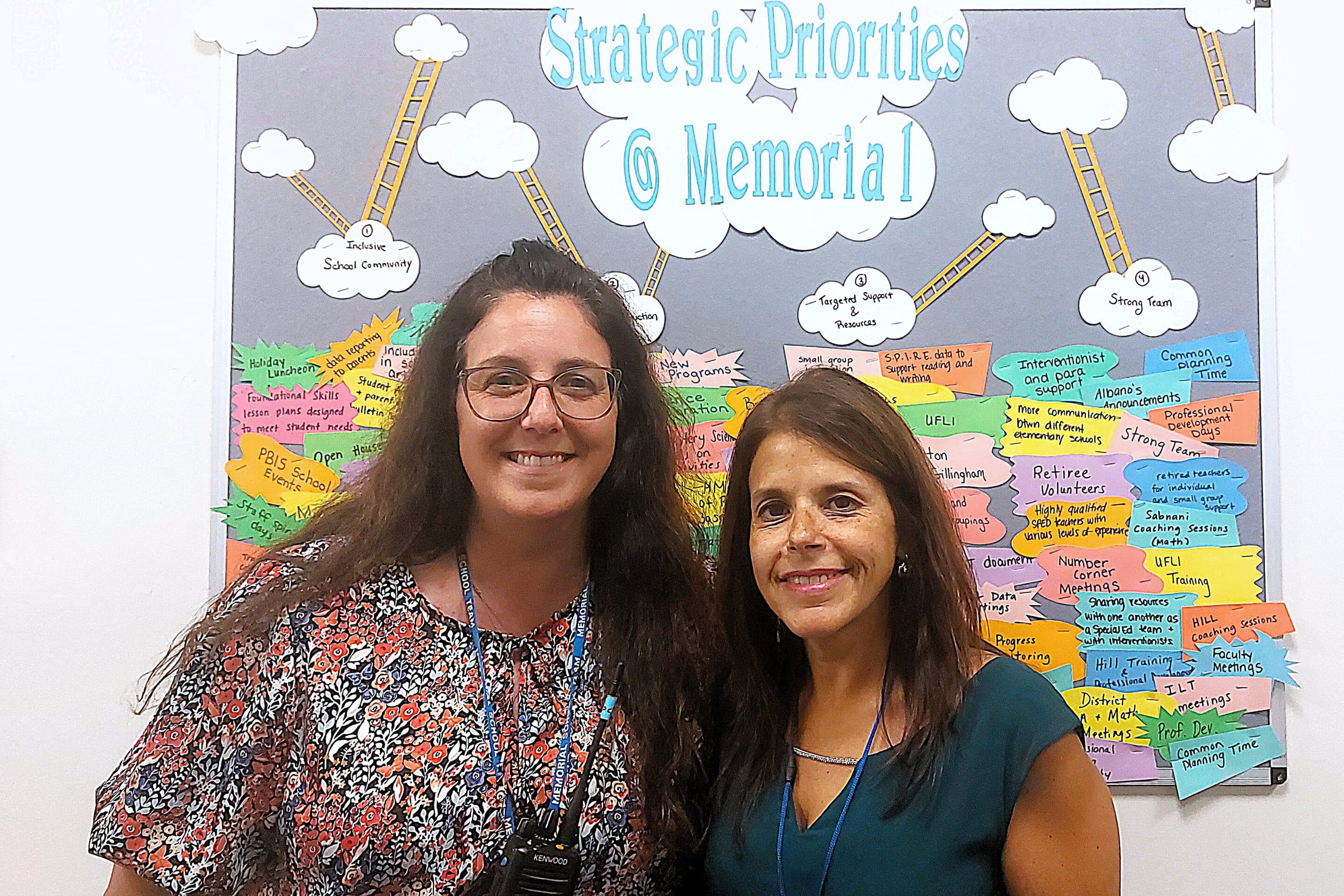West Springfield Public Schools Superintendent Stefania Raschilla and Memorial School Principal Karen Albano stand in front of a board celebrating the school’s strategic priorities.
Reminder Publishing photo by Sarah Heinonen
WEST SPRINGFIELD — Each year, as part of the state Department of Elementary and Secondary Education’s accountability reporting, it selects schools that have exceeded targets for growth and improvement.
This year, West Springfield’s Memorial School was named one of just 55 Schools of Recognition.
Memorial School Principal Karen Albano explained that DESE identifies its Schools of Recognition by achievement growth in math, literacy and science, as measured by the MCAS, combined with improvements in attendance rates. For the 2024-25 school year, Memorial School reached 85% of the goals DESE had set for it, up from the 69% of goals it had reached the previous year.
MCAS is administered in the spring to elementary students in grades 3, 4 and 5. Superintendent Stefania Raschilla shared that Memorial students’ 2025 MCAS scores improved by between five and six points over the previous year. While not quite as high as they were in 2019, before the coronavirus pandemic forced schools to close, the scores are higher than the state average. She anticipated that they would regain pre-pandemic levels by 2027.
Albano said there have been efforts to build foundational math skills through the Bridges program. Students who have gaps in early skills receive intervention instruction to build on in their grade-level classes. Albano said interventions are scheduled so as not to take children out of core class instruction.
Raschilla and Albano both spoke highly of the universal screening tools used to identify which children need additional support. The data can help educators pinpoint which skills are needed and show progress as the year progresses. Albano also said instructional support teams — educators and counselors who identify academic, social-emotional and behavioral barriers to success in the classroom — have made a large difference in helping struggling students.
Raschilla explained that chronic absenteeism, defined as missing 10% or more of school days, is a problem in schools nationwide and there are a myriad of reasons underpinning the trend. In the 2023-24 school year, memorial school grappled with 31% of students being considered chronically absent. At the end of the 2024-25 school year, that population of students had dropped to 18%.
When students miss school, Albano said, it impacts them beyond simply missing learning time. She said students fail to make connections to other students and educators, and without those connections, they are not fully ready to learn.
Albano explained that, beyond adhering to the district policy of sending letters home to families when a student misses a critical amount of time, the school began implementing targeted initiatives. Albano explained that data showed students often missed scheduled half days occurring just before a holiday or school vacation. To combat this, teachers began scheduling fun activities for those days and promoting them widely. She said this encouraged students to want to come to school on those days.
Then, Albano said the school began bringing families of chronically absent students in for one-on-one meetings to discuss, not just their student’s number of absences, but also the barriers to attendance and plans to address the issue.
“I can’t think of one meeting that wasn’t positive,” Albano said. She praised West Springfield families, saying, “I was struck by how close families want to be to their child’s education period that feels unique” to West Springfield, she said.
Raschilla also cited the “high family engagement rate at all our elementary schools,” and described families as the School Department’s “partners” in education. However, she also applauded Albano, noting that the latter had accomplished these achievements in just one year in West Springfield. Prior to being hired to head Memorial School, Albano was a principal in Northampton.
Raschilla said the School Department knew that there were changes needed at Memorial School that were perhaps not needed at other, higher-performing elementary schools, and funding was directed to the school to address its needs. To some extent, she said Memorial served as a pilot from some initiatives, and knowing which programs work, the School Department can decide if they should be rolled out to other schools.
Albano said educators from the other elementary schools have visited Memorial to see the hands-on application of initiatives that have led to the school’s higher scores. So far, she said, teachers have been excited by what they’ve seen.


